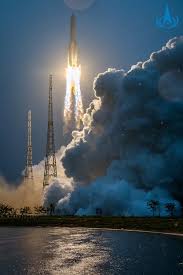By: Maggie Z
On May 3, 2024, China’s Chang’e 6 lunar probe launched from the Hainan province. The spacecraft landed on the moon’s surface on June 2, took a few samples, and landed back on Earth on June 25, 2024. The team of scientists who sent it up to space greeted it enthusiastically upon return, as those samples will help obtain crucial knowledge about future lunar settlements. They are rock samples from the far side of the moon!
For generations before better technology was produced, the ‘dark side’ was considered dangerous, mysterious, and untouched. No man has ever walked the side of the moon facing away from Earth. China is the first country to send a spacecraft to the moon’s far side.
The craft was launched into space on a Long March-5 rocket, which blasted off the Wenchan Spacecraft Launch Site in Hainan. It has a total takeoff weight of 8.2 tons and is made of an orbiter, a landed, an ascender, and a returner.
On June 2, the spacecraft landed in the South Pole-Aitken basin, a large, 1500- mile-wide, and 5- mile-deep crater on the far side of the moon. According to Guinness World Records, it is the “largest and deepest such crater known in the Solar System.” The first thing the craft did after opening its solar panels was plant a basalt version of China’s national flag in its center.
Chang’e 6 then proceeded to take high-resolution photos of the moon from different angles. After that, it began drilling into the moon’s surface, scooping up rocks and regolith. Chang’e 6 was expected to collect around 4 pounds of moon matter, which it did with the aid of its moon rock-customized tools.
Following its return to Earth’s atmosphere with its samples, all that remained of the craft was its return capsule. Scientists stationed around the location rushed to receive the capsule, taking it back to the lab and unpacking Chang’e 6’s contents with great care.
After loosely examining the moon rock, these scientists announced that they would keep a small portion of the moon matter and distribute it evenly to the rest of the world for thorough study.“[This is] a fear that will offer scientists an unprecedented opportunity to study the lesser-understood lunar face that is never visible from Earth,” reported the Smithsonian Magazine.
If one day we do build settlements on the moon, we just might owe it to Chang’e 6.











